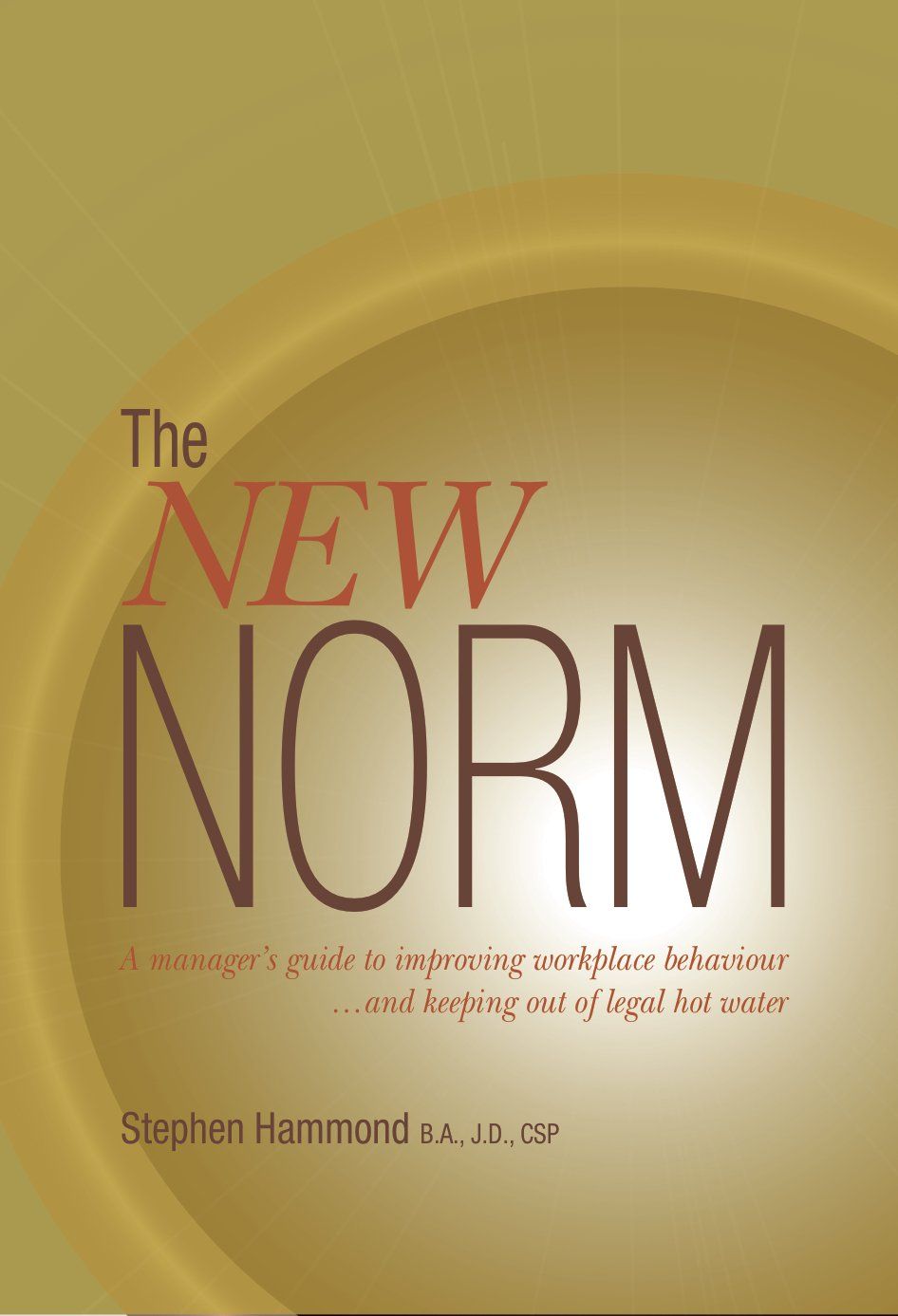Chapter three
THE NEW NORM DOESN’T LET power go to his head
In October, 2014, a CBC spokesperson explained that Jian Ghomeshi was taking a leave of absence from his job as host of CBC’s popular radio program Q “to deal with some personal issues.”
Many thought it had something to do with the death of his father. What we quickly discovered was that Ghomeshi was being accused of sexual assault (still in litigation as this is published) and all kinds of inappropriate behaviours at work. Without diminishing the assault allegations outside of work, nor finding guilt before legal proceedings are complete, let’s look at what we know regarding his workplace behaviours.
Whereas most workplaces don’t have reports, and if they do, most don’t make them public, in this case we get the benefit of knowing all the details of one report that showed him to be quite a tyrant.
The investigation took five months, with ninety-nine people giving some type of information to lawyers Janice Rubin and Parisa Nikfarjam. The report written of their investigation spells out a wide variety of inappropriate behaviours. Two sentences in particular sum this up:
“The evidence suggests that many of those who worked with Mr. Ghomeshi expended a great deal of energy dealing with this behaviour and conduct, and that it was deeply distressing to them, and impactful on them. To be clear, it is our opinion that Mr. Ghomeshi's conduct such as yelling, belittling and humiliating those with whom he worked fell well below the acceptable standard.”
Because he was considered a “star,” his bad behaviours were excused. Some employees even thought that as host, you were expected to deal with “big personalities, big egos and big demands.” And a senior manager was quoted as saying, "There tends to be a belief that bad behaviour is excused by results."
Chris Boyce, the executive director of radio and audio, and Todd Spencer, the executive director of human resources, were fired. The top brass at CBC felt these two managers should have taken action, long before all the sensationalized news hit the airwaves.
Perhaps if Mr. Ghomeshi, Mr. Boyce and Mr. Spencer had taken my Respectful Workplace online course, they would have learned that “star power” or not, you can’t allow workplace harassment to create a toxic workplace environment.
Not long after, in March, 2015 the CRTC (Canadian Radio-television and Telecommunications Commission) announced that cable companies had a year to come up with “pick and pay” options, giving TV subscribers cheaper options.
This didn’t go over well with Bell Media President Kevin Crull. Bell Media is one of four parts of BCE Inc., Canada’s largest telecommunications company with revenues in 2014 of $21 billion. While this company’s goal is to maximize shareholder profits, it also has an obligation to uphold freedoms of the press, since it also owns the largest private sector Canadian TV station, CTV, and with it the largest private sector news programs, CTV news and its affiliated news channels.
Yet in Crull’s huff, he called the president of CTV News, Wendy Freeman, ordering her to bar the chair of the CRTC, Jean-Pierre Blais, from appearing on any of the Bell-owned networks. The Globe and Mail newspaper reported that Freeman thought she would be fired if she didn’t go along with his order.
Clearly Crull thought he had so much power, he could dictate that a news story about one of the biggest changes to Canadian cable subscribers shouldn’t be shared with its viewers. Luckily, Freeman, along with Lisa LaFlamme, the chief anchor and senior editor of CTV National News, advised him that this was inappropriate.
He didn’t realize that in this day of instant news (rather ironic, considering his position), people would find out about this. And since his parent company wasn’t interested in the ways of the Old Norm, three weeks to the day the debacle had begun, Kevin Crull was fired from his job.
These two examples, one from a public broadcaster and one from a private broadcaster, illustrate what happens when people abuse their power. While Ghomeshi’s abuse seemed to be at a more personal level and Crull’s abuse at a more corporate level, the fact is, they all had an impact on individual employees.
If the Globe and Mail was correct that one of the company’s presidents –Wendy Freeman – felt she would be fired, it lets us know that intimidation can happen at any level in any organization.
The OLD NORM
- believes that if you’re a performer, you can get away with almost anything.
- knows that within some workplaces, people are willing to trade civility for performance.
- relies on one’s power, either as a “star” or as the “top guy,” to bully one’s way through any situation.
- is aware that power will prevent people from speaking up or making a complaint because of the impact on their work or career.
The NEW NORM
- knows you’re not truly a “performer” if you abuse your power and the people with whom you work.
- is crystal clear that if “performers” continue to abuse their power, they’ll be working elsewhere.
- realizes you can be a firm manager (if that’s a desired style), as long as the person’s fair.
- would be devastated if he found out any of his employees were fearful of speaking their mind.
Suggestions for the New Norm:
01
When you’ve got power, don’t abuse it. This is different from those who think their workplace “power” is benign. This is a situation where a big boss knows he’s a big boss and has the ability to hire, fire and discipline, sometimes on a whim. When you’re in authority, you get to decide what kind of boss you’ll be. People know you get to make final decisions, but you won’t be the kind to abuse that decision-making power.
02
Don’t surround yourself with “yes” men and women. It’s easy to get defensive when someone comes up with better ideas than you, or criticizes your work, especially when you’re the boss. But a good boss wants employees to be open, honest, critical and always striving to improve the workplace. Let employees know you’re that kind of boss.
03
Don’t let power go to your head. We’re human and sometimes we do things that in hindsight we’re not proud of. When your workplace power goes to your head and you make a mistake, own up to it and apologize. If you let power go to your head and an employee can tell you openly and honestly about it, you’ve created a great workplace. Not perfect, but great.
This chapter gives you an understanding of what can go wrong, when a “star” abuses his authority, when managers enable them and it leads to a toxic workplace.
For more examples where people get into trouble due to power and hierarchy, consider reading Chapter 13: The New Norm doesn’t engage in “baffling and bizarre” workplace behaviour, such as psychological harassment, a toxic workplace and workplace abuse of power.
Purchase a copy of The New Norm, or if you think all your supervisors and managers, could learn many valuable lessons about creating a respectful workplace, free of harassment, bullying and discrimination, you can get volume discounts.
What one reader has to say about Stephen’s book, The New Norm
“Stephen provides a lucid and thought provoking read on the concerns related to inappropriate workplace behaviors.”
Richard Craibbe
Chief Training Officer,
Oakville Fire Department

Respectful Workplace Online Training Course
If you, your employees or your managers want more information,
sign up for my new online training course:
The Respectful Workplace in Canada.
With 10 modules of useful, relevant and current information,
this course can help everyone at your workplace.
This may be the best online harassment training your people will get.
Stephen Hammond is a lawyer turned speaker and consultant in the field of harassment, sexual harassment, bullying, discrimination, diversity and inclusion at work.
The New Norm is Stephen’s third book.






